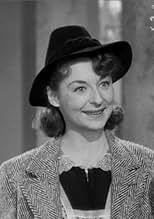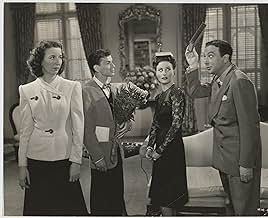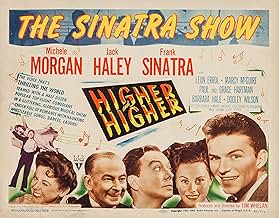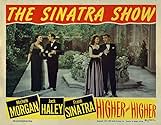IMDb RATING
6.0/10
852
YOUR RATING
With their employer bankrupt, servants scheme to marry maid Millie to a rich husband. But Frank Sinatra lives across the street...With their employer bankrupt, servants scheme to marry maid Millie to a rich husband. But Frank Sinatra lives across the street...With their employer bankrupt, servants scheme to marry maid Millie to a rich husband. But Frank Sinatra lives across the street...
- Nominated for 2 Oscars
- 2 nominations total
Michèle Morgan
- Millie Pico
- (as Michele Morgan)
Robert Andersen
- Announcer at Butler's Ball
- (uncredited)
Paul Bradley
- Wedding Guest
- (uncredited)
Ralph Brooks
- Restaurant Customer
- (uncredited)
Tanis Chandler
- Debutante
- (uncredited)
Featured reviews
As a lover of all kinds of music spanning many era's, I can safely say that Frank Sinatra is far and away my personal favourite and arguably the best male vocalist of all time.
When Higher and Higher was made back in 1944, Sinatra was still working on his craft. He had a typical 1940's Big Band voice, no different really from the likes of Ray Ebberly, Johnny Desmond or Dick Haymes but he was better in many ways. He had yet to develop his own distinctive sound which would become instantly recognisable and would eventually make him the singing sensation of the 20th century.
Yet in this largely forgettable romantic comedy, the tools are there and you are starting to see the true craftsman at work.
Sinatra played himself, which I thought was a mistake as the love stories would have worked better if he was in character and completely detached from his true self. At the time Frank was happily married to his first wife and was already the father of two, yet the script announces his engagement to the lovely Barbara Hale (of Perry Mason fame.) Obviously RKO thought very little of unimportant crimes such as bigamy.
Despite these flagrant liberties taken with Frank's personal life, the film is redeemed as he is given perfect chance to prove to us just why he was the most popular singer of the war years with powerful ballads like, 'I Couldn't Sleep a Wink Last Night,' and, 'A Lovely Way to Spend an Evening.'
What was a double treat for me was that another one of my all time favourite singers also featured in the cast. Mel Torme was an excellent artist but, 'The Man with the Velvet Voice' was not really given much opportunity in this vehicle to show us what a great singer he really was.
However despite the great songs expertly executed by the man himself, and excellent performances by the entire cast, nothing seems to rescue this film from drab dullness.
I think it's main failing was a rather weak and transparent plot, but hell..... if it past a dreary hour or so and took your mind off the horrors and reality of the war, then it had done what it had set out to do.
When Higher and Higher was made back in 1944, Sinatra was still working on his craft. He had a typical 1940's Big Band voice, no different really from the likes of Ray Ebberly, Johnny Desmond or Dick Haymes but he was better in many ways. He had yet to develop his own distinctive sound which would become instantly recognisable and would eventually make him the singing sensation of the 20th century.
Yet in this largely forgettable romantic comedy, the tools are there and you are starting to see the true craftsman at work.
Sinatra played himself, which I thought was a mistake as the love stories would have worked better if he was in character and completely detached from his true self. At the time Frank was happily married to his first wife and was already the father of two, yet the script announces his engagement to the lovely Barbara Hale (of Perry Mason fame.) Obviously RKO thought very little of unimportant crimes such as bigamy.
Despite these flagrant liberties taken with Frank's personal life, the film is redeemed as he is given perfect chance to prove to us just why he was the most popular singer of the war years with powerful ballads like, 'I Couldn't Sleep a Wink Last Night,' and, 'A Lovely Way to Spend an Evening.'
What was a double treat for me was that another one of my all time favourite singers also featured in the cast. Mel Torme was an excellent artist but, 'The Man with the Velvet Voice' was not really given much opportunity in this vehicle to show us what a great singer he really was.
However despite the great songs expertly executed by the man himself, and excellent performances by the entire cast, nothing seems to rescue this film from drab dullness.
I think it's main failing was a rather weak and transparent plot, but hell..... if it past a dreary hour or so and took your mind off the horrors and reality of the war, then it had done what it had set out to do.
Cyrus Drake is a rich businessman who has had his staff of servants for many years a situation that is put a risk when bad investments bankrupt him and threaten to put his loyal staff on the street. To bring money back into the family again, the servants plan to marry off the youngest maid, Millie to a rich man. The staff all pick their roles to establish the ruse, while Millie starts being taught how to be a well educated debutante. However their plans are endangered when singer Frank Sinatra moves in next door and Millie tries to hide her affection for fellow servant Michael.
Billed as a Frank Sinatra film now, really this is a standard romance of the time, which features Frank in a small role as himself in order to get the teenage crowd in the doors (and they say cynical marketing at teens is a recent thing!). Ignoring this role the film is very much an ordinary piece of entertainment that was very much of the period a piece of fluff with a convoluted plot, musical numbers, misunderstandings and true love finding a way by the end. In this regard it is OK but quite average, with no real laughs, no significantly moving moments and nothing that really stands out. The script allows for enough to go on to keep the interest but it is all pretty thin and gradually slips into nothingness with only frequent and lively musical numbers serving to keep boredom at bay. The silly twist towards the end is a good example of how lazy the scriptwriters were basing their happy ending on the thinnest of plot devices.
The cast are mostly OK a mix of romantic parts and fast-talking characters. Sinatra didn't do that well playing himself and he looked uncomfortable like he had been forcibly inserted into the film and felt unwelcome. He got better with time but here he is pretty wooden. Morgan is likable as Millie and Haley enjoys himself with the sort of character that usually plays the sidekick as opposed to his lead role here. Support from Errol, Wickes and an early role from a beautiful Hale (best known as Della Street to my generation) are all good value and help the material appear more interesting and lively than it actually is.
Overall this is very much of its period and it is an average at that. Sinatra may not actually add much on screen but his name made it a bigger film than it could have been and ensures that it gets repeated on television quite often when others have been forgotten. As afternoon television filler it does the job but it is a wholly unremarkable film even with the presence of Sinatra and I imagine that, without his involvement that it would have long since been forgotten.
Billed as a Frank Sinatra film now, really this is a standard romance of the time, which features Frank in a small role as himself in order to get the teenage crowd in the doors (and they say cynical marketing at teens is a recent thing!). Ignoring this role the film is very much an ordinary piece of entertainment that was very much of the period a piece of fluff with a convoluted plot, musical numbers, misunderstandings and true love finding a way by the end. In this regard it is OK but quite average, with no real laughs, no significantly moving moments and nothing that really stands out. The script allows for enough to go on to keep the interest but it is all pretty thin and gradually slips into nothingness with only frequent and lively musical numbers serving to keep boredom at bay. The silly twist towards the end is a good example of how lazy the scriptwriters were basing their happy ending on the thinnest of plot devices.
The cast are mostly OK a mix of romantic parts and fast-talking characters. Sinatra didn't do that well playing himself and he looked uncomfortable like he had been forcibly inserted into the film and felt unwelcome. He got better with time but here he is pretty wooden. Morgan is likable as Millie and Haley enjoys himself with the sort of character that usually plays the sidekick as opposed to his lead role here. Support from Errol, Wickes and an early role from a beautiful Hale (best known as Della Street to my generation) are all good value and help the material appear more interesting and lively than it actually is.
Overall this is very much of its period and it is an average at that. Sinatra may not actually add much on screen but his name made it a bigger film than it could have been and ensures that it gets repeated on television quite often when others have been forgotten. As afternoon television filler it does the job but it is a wholly unremarkable film even with the presence of Sinatra and I imagine that, without his involvement that it would have long since been forgotten.
This may not be one of the best movies ever made but overall it's a very enjoyable, light-hearted piece of froth in which everyone involved seems to be having a good time. Highly recommended for it's feel-good factor alone. OK, so Frank Sinatra's "acting" leaves a lot to be desired but his singing is a great redeeming feature and the songs fit in perfectly with the romantic atmosphere of the film. Sinatra went on to make many more films where his undoubted acting ability shone through but in this, his first venture into Hollywood, his voice, not his acting, is his main contribution to this movie. I've just watched it again on TV and it still lifts my mood as much as it did the first time I saw it many many years ago.
Back in 1944 movie critics weren't given special screenings in order to review soon to be released films, but had to wait for a movie's regular opening to write their reviews. According to the host of American Movie Classics, when "Higher and Higher" first opened, film critics were unable to review Frank Sinatra's performance because the screams of adulation from the overwhelmingly young female audience drowned out all sound.
The first time I ever saw/heard Frank Sinatra was in the late 1960s and I couldn't understand why the women of my mother's generation made such a fuss about Mr. Sinatra. But after seeing this sensual and romantic crooner in "Higher and Higher" I can easily grasp why thousands of young women slept in the streets in order to be the first on line to see the young and appealing Mr. Sinatra.
The first time I ever saw/heard Frank Sinatra was in the late 1960s and I couldn't understand why the women of my mother's generation made such a fuss about Mr. Sinatra. But after seeing this sensual and romantic crooner in "Higher and Higher" I can easily grasp why thousands of young women slept in the streets in order to be the first on line to see the young and appealing Mr. Sinatra.
As a stage play it must have been a hilarious farce, as a film with a
truly great cast it is very funny indeed. To have all those appealing
character actors like Mary Wickes and Victor Borge along with
headliners like Sinatra and Jack Haley all set in a well furnished
RKO mansion adding crooner Mel Torme and a few excellent
songs: "I saw you first" and "A lovely way to spend an evening" and
a good situation comedy storyline, HIGHER AND HIGHER is great
fun. There is a wide range to the tunes too, with some hep jive
from Marcie and Mel and crooner swooner from Frank.....and on a
bicycle too. Sinatra would have been 28 when he made this and
his visual appeal is also undeniable. Good 40s musical stage to
film adaptation.
truly great cast it is very funny indeed. To have all those appealing
character actors like Mary Wickes and Victor Borge along with
headliners like Sinatra and Jack Haley all set in a well furnished
RKO mansion adding crooner Mel Torme and a few excellent
songs: "I saw you first" and "A lovely way to spend an evening" and
a good situation comedy storyline, HIGHER AND HIGHER is great
fun. There is a wide range to the tunes too, with some hep jive
from Marcie and Mel and crooner swooner from Frank.....and on a
bicycle too. Sinatra would have been 28 when he made this and
his visual appeal is also undeniable. Good 40s musical stage to
film adaptation.
Did you know
- TriviaRKO purchased the rights to the play for $15,000 ($254,000 in 2022), specifically to star Frank Sinatra, and the four songs he sings by Jimmy McHugh and Harold Adamson were written to accommodate his singing style. He was billed third because the contracts with Michèle Morgan and Jack Haley prevented higher billing.
- GoofsDuring the song "when it comes to love you're on your own" (c.62 minutes) the doorways have no panes of glass in them on the lower rows, as the house staff join in the song.
- Quotes
Mr. Green: Lovely thing you're playing, Victor. What is it?
Sir Victor Fitzroy Victor: It's a piano.
- SoundtracksIt's a Most Important Affair
(1943) (uncredited)
Written by Jimmy McHugh
Lyrics Harold Adamson
Sung by Mel Tormé, Marcy McGuire, Paul Hartman, Grace Hartman,
Martha Mears, Dooley Wilson, and Ivy Scott
- How long is Higher and Higher?Powered by Alexa
Details
Box office
- Budget
- $600,000 (estimated)
- Runtime1 hour 30 minutes
- Color
- Aspect ratio
- 1.37 : 1
Contribute to this page
Suggest an edit or add missing content



































